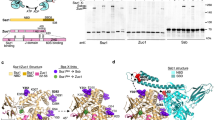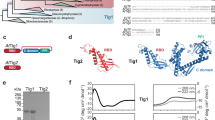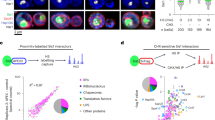Abstract
The role of molecular chaperones in assisting the folding of newly synthesized proteins in the cytosol is poorly understood. In Escherichia coli, GroEL assists folding of only a minority of proteins1 and the Hsp70 homologue DnaK is not essential for protein folding or cell viability at intermediate growth temperatures2. The major protein associated with nascent polypeptides is ribosome-bound trigger factor3,4, which displays chaperone and prolyl isomerase activities in vitro3,5,6. Here we show that Δtig::kan mutants lacking trigger factor have no defects in growth or protein folding. However, combined Δtig::kan and ΔdnaK mutations cause synthetic lethality. Depletion of DnaK in the Δtig::kan mutant results in massive aggregation of cytosolic proteins. In Δtig::kan cells, an increased amount of newly synthesized proteins associated transiently with DnaK. These findings show in vivo activity for a ribosome-associated chaperone, trigger factor, in general protein folding, and functional cooperation of this protein with a cytosolic Hsp70. Trigger factor and DnaK cooperate to promote proper folding of a variety of E. coli proteins, but neither is essential for folding and viability at intermediate growth temperatures.
This is a preview of subscription content, access via your institution
Access options
Subscribe to this journal
Receive 51 print issues and online access
$199.00 per year
only $3.90 per issue
Buy this article
- Purchase on SpringerLink
- Instant access to full article PDF
Prices may be subject to local taxes which are calculated during checkout




Similar content being viewed by others
References
Ewalt, K. L., Hendrick, J. P., Houry, W. A. & Hartl, F. U. In vivo observation of polypeptide flux through the bacterial chaperonin system. Cell 90, 491–500 (1997).
Hesterkamp, T. & Bukau, B. Role of the DnaK and HscA homologs of Hsp70 chaperones in protein folding in E. coli. EMBO J. 17, 4818–4828 (1998).
Hesterkamp, T., Hauser, S., Lütcke, H. & Bukau, B. Escherichia coli trigger factor is a prolyl isomerase that associates with nascent polypeptide chains. Proc. Natl Acad. Sci. USA 93, 4437–4441 (1996).
Valent, Q. A.et al. Early events in preprotein recognition in E. coli : interaction of SRP and trigger factor with nascent polypeptides. EMBO J. 14, 5494–5505 (1995).
Scholz, C., Stoller, G., Zarnt, T., Fischer, G. & Schmid, F. X. Cooperation of enzymatic and chaperone functions of trigger factor in the catalysis of protein folding. EMBO J. 16, 54–58 (1997).
Stoller, G.et al. Aribosome-associated peptidyl-prolyl cis/trans isomerase identified as the trigger factor. EMBO J. 14, 4939–4948 (1995).
Bardwell, J. C. A. & Craig, E. A. Ancient heat shock gene is dispensable. J. Bacteriol. 170, 2977–2983 (1988).
Kumamoto, C. A. & Beckwith, J. Mutations in a new gene, secB, cause defective protein localization in Escherichia coli. J. Bacteriol. 154, 253–260 (1983).
Zeilstra-Ryalls, J., Fayet, O., Baird, L. & Georgopoulos, C. Sequence analysis and phenotypic characterization of groEL mutations that block λ and T4 bacteriophage growth. J. Bacteriol. 175, 1134–1143 (1993).
Paek, K. H. & Walker, G. C. Escherichia coli dnaK null mutants are inviable at high temperature. J. Bact. 169, 283–290 (1987).
Tomoyasu, T., Ogura, T., Tatsuta, T. & Bukau, B. Levels of DnaK and DnaJ provide tight control of heat shock gene expression and protein repair in E. coli. Mol. Microbiol. 30, 567–581 (1998).
Bukau, B. & Walker, G. C. Cellular defects caused by deletion of the Escherichia coli dnaK gene indicates roles for heat shock protein in normal metabolism. J. Bacteriol. 171, 2337–2346 (1989).
Gross, C. A. in Escherichia coli and Salmonella (ed. Neidhardt, F. C.) 1382–1399 (ASM, Washington, 19996).
Gamer, J.et al. Acycle of binding and release of the DnaK, DnaJ and GrpE chaperones regulates activity of the E. coli heat shock transcription factor σ32. EMBO J. 15, 607–617 (1996).
Valent, Q. A.et al. Nascent membrane and presecretory proteins synthesized in Escherichia coli associate with signal recognition particle and trigger factor. Mol. Microbiol. 25, 53–64 (1997).
Acknowledgements
We thank members of the Bukau lab, T. Hesterkamp, M. Müller and H.-G. Koch for comments on the manuscript and discussions. This work was supported by grants of the DFG and the Fonds der Chemie to B.B.
Author information
Authors and Affiliations
Corresponding author
Rights and permissions
About this article
Cite this article
Deuerling, E., Schulze-Specking, A., Tomoyasu, T. et al. Trigger factor and DnaK cooperate in folding of newly synthesized proteins. Nature 400, 693–696 (1999). https://doi.org/10.1038/23301
Received:
Accepted:
Issue Date:
DOI: https://doi.org/10.1038/23301



